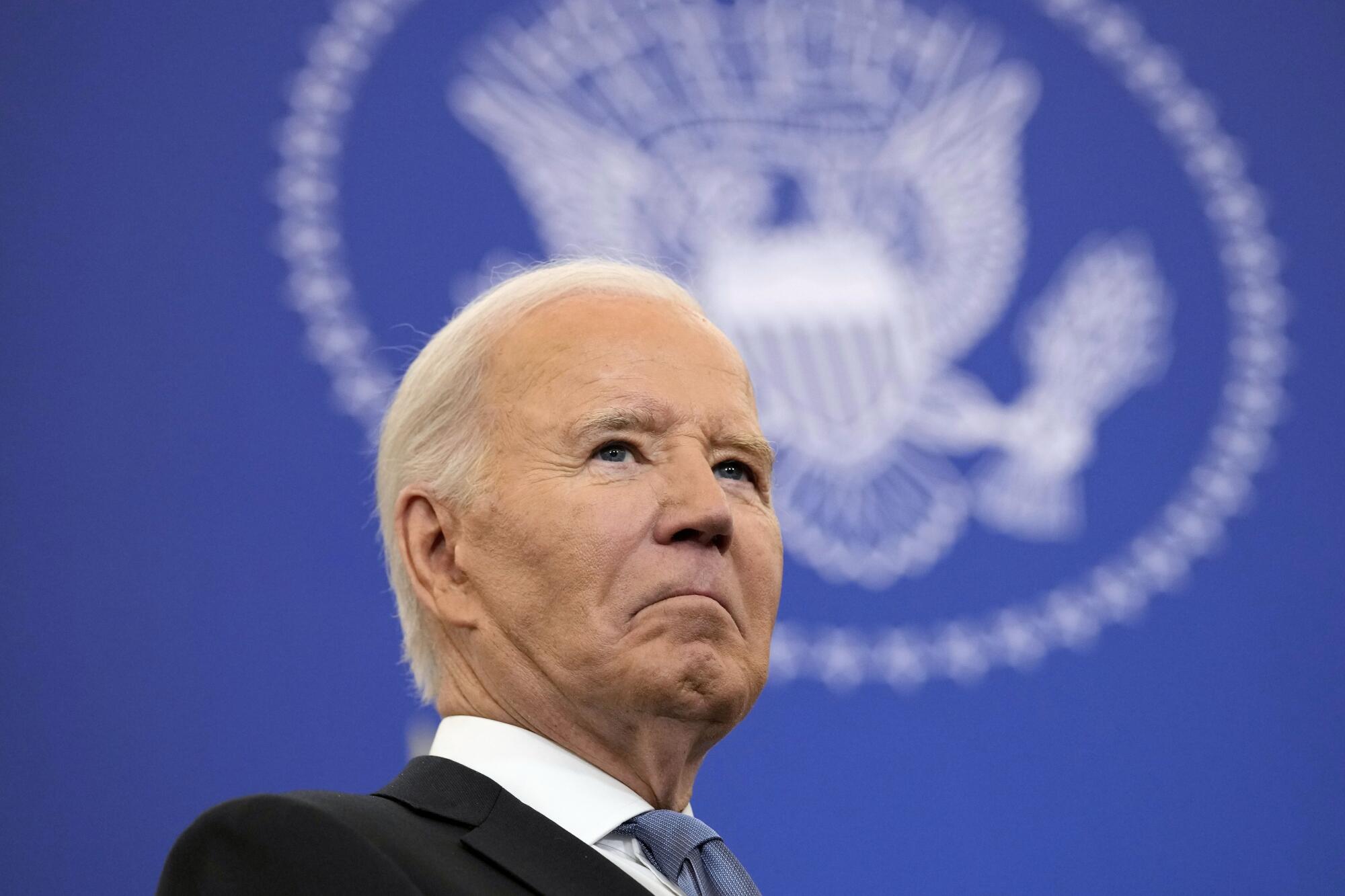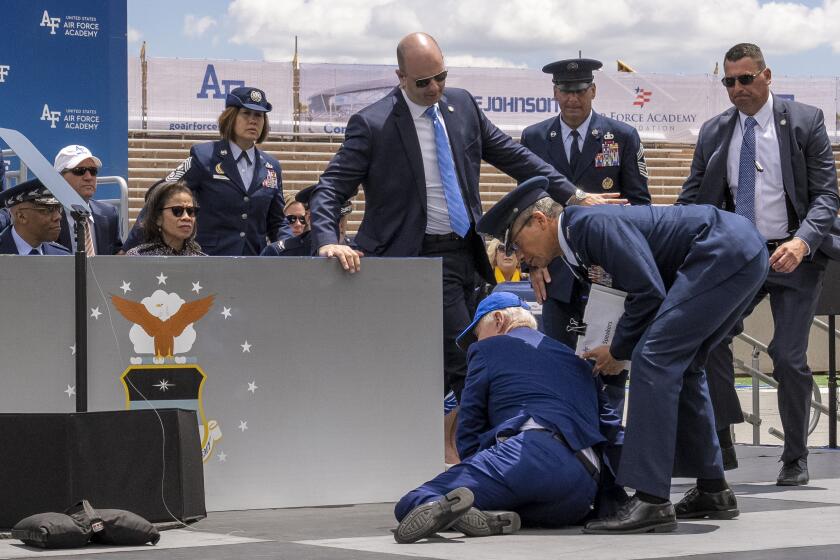
- Share via
Hundreds of thousands of photos were taken of Franklin Delano Roosevelt. And yet, there are only four known photos of him in a wheelchair. This was deliberate. FDR hid his disability from polio, even from his mother. He ordered the Secret Service to destroy images of him in a wheelchair. His doctor, recommended by the physician who’d helped keep the severity of President Wilson’s stroke hidden from public view, was chosen for similar discretion.
Roosevelt even successfully enlisted the press corps in what Hugh Gallagher called, in his book by the same name, FDR’s “splendid deception.” It was easy to rationalize the decision. Between the Great Depression and the Second World War, journalists felt that they should go along with the effort to portray the president as physically up to the job, for the sake of American morale.
Jake Tapper and Alex Thompson’s book has already generated a national debate about whether the White House deceived the public about the president’s cognitive state and how Biden’s late exit from the race undermined the Democratic Party’s chances of stopping Trump.
These are just the most egregious examples of this kind of obfuscation. But there were others. Grover Cleveland had a tumor removed on what the White House claimed was a “fishing trip.” The severity of Dwight D. Eisenhower’s heart attack in 1955 was downplayed so as to not jeopardize his reelection. JFK suffered from Addison’s disease and was “treated” by his personal physician “Miracle Max” Jacobson, a.k.a. Dr. Feelgood, who gave him “vitamin” shots loaded with amphetamine and methamphetamine. The public had no idea until a New York Times report in 1972.
In other words, the controversy over Joe Biden’s infirmity — and now his just-revealed stage 4 prostate cancer — is not nearly so new as it may seem.
That controversy, re-ignited by the publication of “Original Sin: President Biden’s Decline, Its Cover-Up, and His Disastrous Choice to Run Again,” by Jake Tapper and Alex Thompson, was dominating the political conversation until the Biden family released news of his cancer. According to Tapper (an anchor at CNN, where I am a contributor) and Thompson (a reporter for Axios), Biden, his family and his closest aides conspired to hide the extent of Biden’s mental and physical decline from the public. Motivations varied, as they often do, from an intense partisan desire to keep Donald Trump from retaking the White House, to Biden’s own denial and vanity, to a desire by his closest aides to stay in power.
As one high-level aide told the authors, “He just had to win, and then he could disappear for four years — he’d only have to show proof of life every once in a while.”
Former President Biden’s diagnosis has divided medical experts over the likely progression of his prostate cancer and resurfaced questions in Washington over his decision last year to run for reelection.
Suspicions that the cancer revelation is an extension of Team Biden’s desire to control the narrative over his health are hard to avoid. David Axelrod, a Democratic strategist and power broker who was very vocal about the political problems presented by Biden’s age, had the kind of reaction the Biden team probably hoped for. “Those conversations [about Biden’s infirmity and the effort to conceal it] will happen, but they should be more muted and set aside for now as he’s struggling through this.”
It’s hard to gainsay the spirit of Axelrod’s compassion. There’s no call for the viciousness some have spewed in response to an 82-year-old grandfather and husband’s cancer diagnosis. But skepticism is warranted all the same, even if it comes from partisans. As many doctors — including oncologist Zeke Emmanuel, a former Biden administration medical advisor — have noted, prostate cancer is very slow-moving, and it is surprising that a two-term vice-president and one-term president could have so many high-profile medical exams without it being caught before now. Whatever the truth, history — both Biden’s and that of the presidency — makes asking unpleasant questions legitimate.
A new book details what we should have realized: Biden’s inner circle was working overtime to conceal his worsening condition.
One of the obvious and much-discussed lessons from this chapter is that the news media should indulge its skepticism of those in power a lot more, particularly when doing so is politically or ideologically undesirable. For many Republicans, reporters’ relative lack of curiosity about Biden’s health and acuity can be explained entirely by the partisanship of journalists who, fearful of a Trump restoration, hid the truth.
Less discussed, however, is that partisanship can be a useful tool in exposing the truth as well. Axelrod didn’t push for removing Biden from the 2024 ticket because he’s a Republican. He’s a partisan Democrat who found it necessary to tell the truth for the sake of the party’s chances of winning.
Similarly, the right’s response to “Original Sin” and its revelations hasn’t been one of shock but of “we told you so.” Highlighting Biden’s infirmity suited their partisan ends, but that doesn’t mean it wasn’t true. Many in the media forgot that partisanship is often one of the only things that can motivate people to give voice to unpleasant truths.
More to Read
Insights
L.A. Times Insights delivers AI-generated analysis on Voices content to offer all points of view. Insights does not appear on any news articles.
Viewpoint
Perspectives
The following AI-generated content is powered by Perplexity. The Los Angeles Times editorial staff does not create or edit the content.
Ideas expressed in the piece
- The article argues that historical precedents, such as Franklin D. Roosevelt’s concealment of his polio-induced paralysis, demonstrate a long-standing pattern of presidential health obfuscation. FDR avoided public use of wheelchairs, relied on staged appearances, and collaborated with the press to hide his disability[1][4][5].
- Media compliance in masking leaders’ physical limitations is highlighted by FDR’s era, where journalists agreed not to photograph him in his wheelchair, reinforcing a carefully curated image of strength during crises like the Great Depression and World War II[4][5].
- The author contends that partisanship, while often criticized for bias, can also expose truths. Democratic strategist David Axelrod’s public concerns about Biden’s fitness, despite ideological alignment, exemplify how political motives sometimes align with transparency.
Different views on the topic
- Historical context suggests that FDR’s discreet use of a customized wheelchair—a modified kitchen chair—and reliance on aides for mobility were pragmatic adaptations to maintain leadership efficacy, not solely acts of deception[2][3]. The press’s compliance may have stemmed from a belief that projecting stability during national emergencies outweighed full transparency[4].
- Medical experts at the time emphasized that polio survival required robust health, which FDR leveraged to downplay his condition. This framing allowed him to portray himself as resilient despite his paralysis, complicating modern comparisons to other leaders’ health controversies[1][4].
A cure for the common opinion
Get thought-provoking perspectives with our weekly newsletter.
You may occasionally receive promotional content from the Los Angeles Times.













